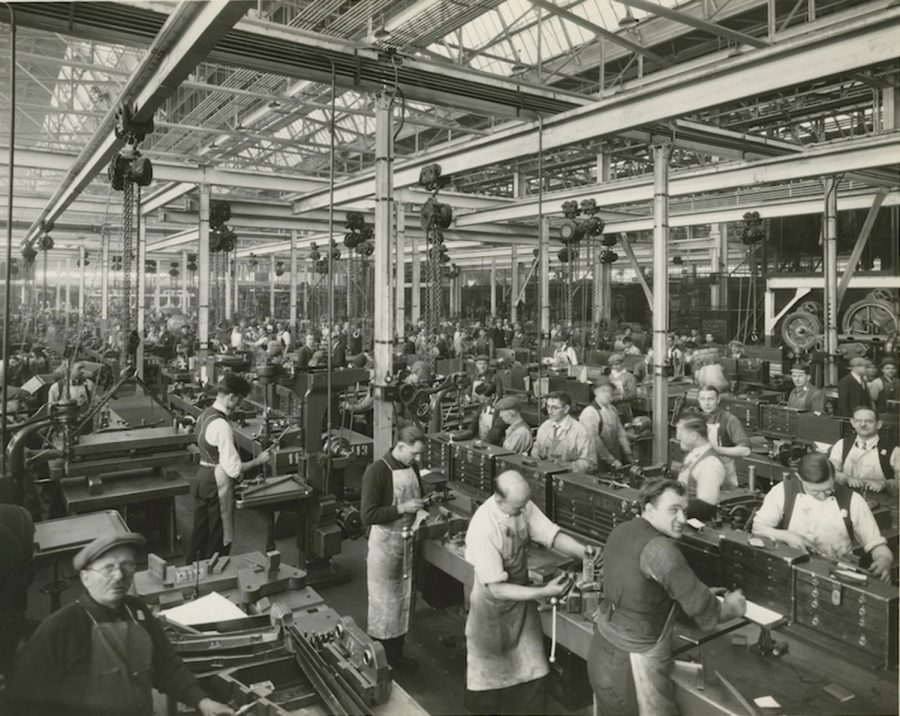The Truth about Today’s Education System (Op-Ed Article)
December 17, 2021
For years, students all around the world have gone to school for almost their whole life starting from when they were 5 years old, maybe even younger. We as students are taught that we have to follow a certain schedule when it comes to school. Teachers are taught to teach a certain way. However, do students and teachers really know the history behind all of this and why teachers and students are being taught how a school must be run? It all starts with the Industrial Revolution. Factory owners were required to be docile. They needed to be workers who show up on time and do what their managers told them. If you think about it, this is very similar to sitting in a classroom all day with a teacher who was trained on how they should teach us. Schools were evolved to suit factory work. The school system was set up like the Industrial Revolution, not to mention the fact that it was set up over 120 years ago and it continues to go on today. Students are being placed in grades according to their age, and moved through successive grades as they master the curriculum. They took an industrialized approach to education: impersonal, efficient, and standardized. The idea that factory workers had to show up and take orders from a boss (someone they were not even related to) was demeaning and emasculating. Factory conditions were often terrible and completely changed how people organized their days. Time was no longer their own. This relates to how students are being taught in a school curriculum. They have to listen to teachers and staff that they barely know and to take time out of their day to sit and learn from the same building for almost 8 hours a day for 5 days a week. In some cases, the information they learn is not applicable to the real world.
During my free time, I took the time to have a meeting with the person who inspired me to write this article, Ms. Webber, my English teacher. I had asked Ms. Webber if we could discuss the idea of our education having an industrialized structure and she gladly agreed to do so. She explained to me that as a teacher, she feels inspired to push for change. She believes that the educational curriculum includes strong themes, life lessons, and valuable skills for us students to become successful individuals in the real world. However, how these lessons are being taught should change according to student needs, advances with society and as we do more studies on how students best learn.
For example, five paragraph essays can teach strong writing skills, but what about giving students different options and allowing them the chance to relate to today’s technological advances? In order to do this, she suggested allowing students the option to produce a podcast where they are able to express their ideas and opinions in an argumentative style rather than asking that all students complete the traditional five paragraph essay. She also began to explain that while teachers have the option to make modifications to their lessons in order to make them more engaging and suited to diverse student learning styles, it can be overwhelming to make these adjustments on their own time. Although schools try to provide teachers time to plan for lessons and get work done, sometimes it can still be overwhelming and time consuming to create lessons that have never been tried before and are engaging and interesting for students. This explains why it can be easier for teachers to fall back on lessons that have already been made or taught in previous years. She also explained how the lessons students are given are too long and repetitive. Every lesson is almost the same, such as how students are given reading after reading and questions to answer to go along with those texts. Lastly, Ms. Webber explained how in most lessons, not all the information is being given as it could unfold the truth and it may cause a change into the future. I was intrigued with what it was like from a teacher’s perspective to teach us students a certain way, in a factory-like way. This is similar to how it can be hard for teachers to adjust lesson plans to meet the needs of their ever changing students. It can be a daunting task to change an entire education system that was built over 120 years ago to meet the needs of a more modern society. I was inspired and in shock with the things that she had to say because it made me wonder why the school system is still like this? Why don’t we all come together to try and improve our school system to where it is more beneficial for us students?
As a student, having the same repetitive schedule 8 hours a day, 5 days a week is tiring and exhausting. The sound of the bell goes off, giving us that reminder that it’s time to move to our next class. As I thought more about this factory-like way that we are being taught, I started to think about the lessons we are learning. I thought about how they are helpful, but are they really beneficial for the real world? After high school, many students are stuck with the question of “what’s next?” They start to wonder if they are going to continue studying or if they will go straight into the workforce. I wonder why the school curriculum doesn’t teach us beneficial things like how to manage personal finances, different ways to succeed, mental and physical survival skills, paying bills, credit that helps students so they are not stuck with questions. After high school, many students are being taught these things from others or they have to learn on their own. How will we ever know the right way to complete these real world tasks if we are being self-taught or being taught from the past experiences of others? I believe the school curriculum needs to improve so it is more beneficial for students. Change needs to be enforced and it starts with the truth. Being given one day of class time to discuss the truth and history behind our education would be really interesting. It is important to learn the history behind our education, learning how and why it works the way it does. This may give students more encouragement and interest in their education. This is similar to how a lot of the time in most lessons, not all the information is being given as it could unfold the truth and it may cause a change into the future. We need to know the truth behind our educational system and aspire for improvement in our educational system so it benefits students.
In conclusion, for over 120 years, students around the world have gone to school for almost their whole life and are being taught to follow a certain schedule. Additionally, teachers are taught to teach a certain way. Do students and teachers really know the history behind all of this and why teachers and students are being taught on how a school must be run? It all starts with how they took an industrialized approach to education: impersonal, efficient, and standardized. Factory owners were required to be docile and they needed to get workers who showed up on time and do what their managers told them. This is similar to how students are required to follow directions from a teacher and how students have to sit in a classroom all day with a teacher who was trained on how they should teach. Schools were evolved to suit factory work. The school system was set up like the Industrial Revolution. Is the factory-like school curriculum that was built over 120 years ago really beneficial and helpful for us students? What about the actual lessons that are being taught in a classroom? How many students after high school are stuck with the question of “what’s next?” They start to wonder if they are going to continue studying or will they go straight into the workforce. Why aren’t we students taught about beneficial topics such as how to manage personal finances, different ways to succeed, mental and physical survival skills, paying bills, credit, and so many more important lessons to where it helps students so they are not stuck with questions. Instead, we are being taught these things from others or we have to learn on our own. How will we ever know the right way to complete these real world tasks if we are being self taught or being taught from other’s past experiences? This is similar to what Ms.Webber said about how she believes that the educational curriculum includes strong themes, life lessons, and valuable skills for us students to become successful individuals in the real world, but how these lessons are being taught should change according to student needs, advances with society. I believe the school curriculum needs to improve and change needs to be enforced to where it’s more beneficial for us students. It starts with the truth. At least being given one day of class time to discuss the truth and history behind our education is important. It’s important to learn the history behind our education, learning how and why it works the way it doesn. The truth matters, we matter, and Change can happen. It starts with us and the truth.




